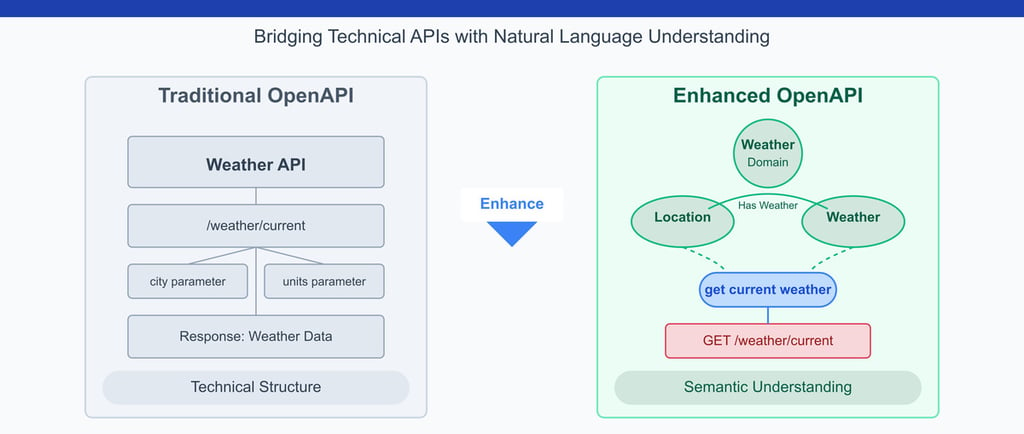Enhancing OpenAPI for Semantic & Natural Language Understanding
Is OpenAPI ready for the age of natural language APIs and intelligent agents? Explore the proposal to enhance OpenAPI with semantic extensions, enabling natural language interaction and automated domain knowledge graph generation. Learn how this evolution can shape the future of APIs.
ARTIFICIAL INTELLIGENCE
Prasad Bhamidipati
3 min read


Introduction:
OpenAPI Specifications (OAS) have become the bedrock of modern API development, providing a vital standard for describing and consuming APIs. As we look ahead to a future increasingly shaped by intelligent agents and natural language interfaces, it's crucial to consider how we can evolve our API specifications to meet these emerging demands. While the current OpenAPI specification excels in detailing the technical mechanics of APIs, a significant opportunity exists to enrich it with semantic understanding.
This is the driving force behind the OpenAPI-NLU proposal, an initiative aimed at extending the OpenAPI specification to better support natural language interaction and the generation of domain knowledge graphs. This proposal seeks to bridge the gap between the technical API details we currently document and the richer domain-level understanding required for the next generation of API-driven applications.
The Vision: Semantic Enrichment through Proposed `x-nl-` Extensions
This proposal is not about overhauling the existing OpenAPI standard, but rather about strategically enhancing it. It introduces a set of `x-nl-` extensions, proposed for inclusion in the OpenAPI specification, designed to inject semantic awareness directly into API definitions. Imagine the power of adding a "natural language intelligence" layer to the technical blueprints you already create.
These proposed extensions are thoughtfully integrated throughout the OpenAPI document structure:
* API-level (`x-nl-domain`, `x-nl-entities`): The proposal suggests defining the overarching domain and core entities managed by an API at the root level. By explicitly declaring, for example, "This API is in the 'Weather Information' domain and manages 'Location' and 'WeatherCondition' entities," we lay the groundwork for automated domain knowledge graph generation, directly from the specification itself.
* Endpoint-level (`x-nl-intent`, `x-nl-operations`): To improve machine understanding, the proposal recommends clearly articulating the intent behind each API endpoint using natural language phrases. Instead of relying solely on technical descriptions like "`/weather/current` - Get current weather," the proposal introduces `x-nl-intent: "get current weather"`. This explicit intent declaration is invaluable for natural language understanding (NLU) systems. Furthermore, the proposed `x-nl-operations` extension allows for categorizing endpoint functionality at a domain level, significantly enhancing API discoverability and semantic search.
* Parameter-level (`x-nl-entity-type`, `x-nl-relationships`): The proposal includes semantic annotation of parameters by linking them to defined domain entities (`x-nl-entity-type: "Location"`) and even specifying parameter-contextual relationships (`x-nl-relationships`). This refined level of detail is critical for intelligent agents to grasp the meaning of each parameter beyond just its data type and format.
* Body-level (`x-nl-entity-type`): For request and response bodies, the proposal suggests using `x-nl-entity-type` to clarify the domain entity they represent. This provides essential semantic context for data interpretation and automated processing.
Unlocking Transformative Benefits: Moving Towards Semantic APIs
The true power of the OpenAPI-NLU proposal lies in its potential to transform how we interact with and understand APIs. By embedding semantic information directly into the specification, we can unlock a range of significant advantages:
* Enabling Natural Language API Interaction: The proposal paves the way for building intelligent assistants capable of truly understanding API documentation and guiding users through natural language. The proposed `x-nl-intent` catalog would become a vital resource for training robust NLU models, enabling seamless voice or chat-based API interactions.
* Facilitating Automated Domain Knowledge Graph Construction: A key aspect of this proposal is the automated generation of domain knowledge graphs directly from enhanced OpenAPI specifications. This capability promises to revolutionize API discovery, integration, and impact analysis, allowing machines to intelligently navigate and comprehend complex API ecosystems.
* Enhancing API Documentation for All: By incorporating the proposed `x-nl-` extensions, API documentation can be enriched with semantic context, making it significantly more understandable not only for human developers but also for machines. This advancement will lead to smarter API explorers, more intuitive developer portals, and improved overall API usability.
* Providing Training Data for Intelligent Agents: The structured semantic information embedded through these proposed extensions creates a rich source of training data for AI agents designed to interact with APIs. This, in turn, will accelerate the development of truly intelligent and autonomous API clients.
A Collaborative Path Forward: Standardizing Semantic APIs
The OpenAPI-NLU proposal represents a significant step towards the future of APIs. It recognizes the growing importance of natural language interfaces and machine intelligence in the API landscape. By considering and adopting proposals like this, the OpenAPI community can collectively evolve the specification to meet the challenges and opportunities of this new era.
This proposal offers a path to bridge the semantic gap and build APIs that are not only technically robust but also semantically rich and inherently intelligent. It's an invitation to shape the future of API specifications.
Checkout the full proposal here
Your feedback and contributions are essential as we explore the evolution of OpenAPI for the age of natural language and intelligent systems. Share your thoughts in the comments below!
Expert articles on AI and enterprise architecture.
Connect
prasadbhamidi@gmail.com
+91- 9686800599
© 2024. All rights reserved.